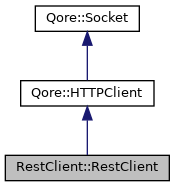 |
Qore RestClient Module Reference
1.7.5
|
 |
Qore RestClient Module Reference
1.7.5
|
this class provides the REST client API More...

Public Attributes | |
| const | Accept = AcceptList.join(",") |
| Accept header value. | |
| const | AcceptList = ... |
| Accept header list. | |
| const | AcceptMap = map {$1: True} |
| Map of acceptable Mime types. | |
| const | CompressionThreshold = 1024 |
| default threadhold for data compressions; transfers smaller than this size will not be compressed | |
| const | DataSerializationOptions |
| Data serialization options; this is a hash to simulate a set of strings. More... | |
| const | DataSerializationSupport |
| Data serialization support mapping codes to MIME types and de/serialization functions. | |
| const | DefaultHeaders |
| default HTTP headers (Content-Type is added before sending) | |
| const | EncodingSupport |
| Send content encoding options. More... | |
| const | Version = "1.7" |
| RestClient Version. | |
| const | VersionString = sprintf("Qore-RestClient/%s", RestClient::Version) |
| RestClient Version String. | |
this class provides the REST client API
| const RestClient::RestClient::DataSerializationOptions |
Data serialization options; this is a hash to simulate a set of strings.
Data serialization options are as follows:
"auto": prefers in this order: json, yaml, rawxml, xml, url, and text"bin": for binary message bodies without data serialization"json": use only JSON serialization"rawxml": use raw XML serialization"text": use only plain text. No serialization is used."url": for URL-encoded message bodies"xml": use only XML-RPC serialization"yaml": use only YAML serialization | const RestClient::RestClient::EncodingSupport |
Send content encoding options.
Send content encoding options are as follows:
"bzip": use bzip2 compression"gzip": use gzip compression"deflate": use deflate compression"identity": use no content encoding